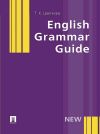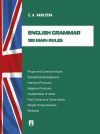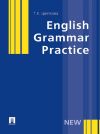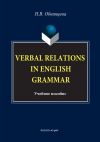Текст книги "English verb tenses for lazybones"

Автор книги: Елена Васильева
Жанр: Иностранные языки, Наука и Образование
сообщить о неприемлемом содержимом
Текущая страница: 1 (всего у книги 1 страниц)
E. A. Vasilyeva
English verb tenses for lazybones

Information
УДК 811.111'36(075.8)
ББК 81.2Англ-923
В19
Vasilyeva E. A.
One of the most effective skills in studying English is the ability to feel confident in using different grammar structures. The reference guide helps to find your way through the maze of numerous English verb forms in a short time. Such categories as voice, mood, basic verb forms, sentence structures are defined and explained in a form of tables with several examples to each rule. The combined chart of tenses is given in the guide too.
УДК 811.111'36(075.8)
ББК 81.2Англ-923
© Vasilyeva E. A., 2014
© Ltd. «Prospekt», 2014
Table of English Tenses
1. Basic Forms

2. Types of Verbs



3. Regular and Irregular Verbs

4. Mood

5. Voice

6. Sentence Structure
The word order is fixed: the subject (S), the predicate (P), the Object (O), the Adverbial Modifier (Adv).

1. Simple Tenses Active
1.1.1. The Present Simple Tense

• General actions; e.g. People build houses of different materials.
• Universal truths; e.g. The sun rises in the east.
• Habitual actions; e.g. Sam reads a newspaper at breakfast.
• Time expressions: never, seldom, hardly ever, rarely, occasionally, sometimes, from time to time, regularly, often, frequently, every day/ month/year, usually, always. e.g. We often meet Liz in the sports club.
• Instructions, directions; e.g. Clean your teeth twice a day.
• Demonstrations, step by step instructions; e.g. First I wash the potatoes, peel them, cut and add a little salt.
• Timetables (verbs of movement): to arrive, to come, to start, to leave и т. д. e.g. The classes start at 9 a.m.
1.1.2. The Past Simple Tense

• Statement of facts; e.g. Columbus discovered America.
• A succession of past events; e.g. We met in the club, played a game of snooker and then went to the cinema.
• A single action in the past; e.g. Bob finished his dinner half an hour ago.
• A repeated action in the past; e.g. Every summer the Potters visited their friends in Australia.
• No connection with the present situation; e.g. I didn't have a car when I was young.
• Specific time – yesterday, some time ago, the other day, in 1995, during the trip, last Monday, then, when, just now e.g. Judy phoned just now.
1.1.3. The Future Simple Tense

• A single action in the future; e.g. I'll stop smoking one day.
A repeated action in the future; e.g. Tom will go to the swimming pool three times a week.
«Time expressions – next week, tomorrow, in 2010, in a month, later, one day etc.
• Feelings, doubts, thoughts without any objective evidences. (I think, I guess, I suppose, probably, perhaps, etc.) e.g. I won't pass the exam. e.g. It will be cold tomorrow. e.g. Cars will be very different in the year 2050.
• A future action is definite with some objective evidences at present (am/is/are going to); e.g. Look! Jack is going to jump off the tree.
• A future action is unplanned, spontaneous e.g. What will you do at the weekend? – I don't know. Perhaps I'll invite friends to my place.
• A future action is planned or arranged (am/is/are going to); e.g. They are going to buy a new car soon.
• Personal plans, informal schedule (place and time is often pointed out), (the Present Continuous Tense); e.g. I'm having an interview at 12. 00 on Tuesday.
• Formal schedules, instructions (the Present Simple Tense); e.g. Next train for Liverpool leaves at 7.30. Where do I buy the tickets for this train?
1.1.4. If, when clauses
If clauses with if, suppose (that), provided (that), etc.
If + N + V (Present Simple),
N + will/shall + V
E.g. If I come, I'll see you.
You will make a lot of mistakes unless you learn the rule.
We'll meet with Ann's parents provided that Tom introduces us to her first.
When clauses with before, as soon as, after, when, until, while, etc.
When + N + V (Present Simple),
N + will/shall + V
E.g. They will believe it when they see it.
Mrs. Gordon won't buy fruit until the price falls.
We'll be ready before you count ten.
While I live, I shall never forget my mother's eyes.
2. Simple Tenses Passive
1.2.1. The Present Simple Tense (Passive)

E.g. I am often invited to housewarming parties.
E.g. English is spoken all over the world.
1.2.2. The Past Simple Tense (Passive)

E.g. We weren't invited to a housewarming party last week.
E.g. Were any questions asked about you?
1.2.3. The Future Simple Tense (Passive)

E.g. Will he be invited to a housewarming party?
E.g. The matter will be discussed tomorrow.
3. Continuous Tenses Active
2.1.1. The Present Continuous Tense

• An action is going on now, at the moment of speaking. E.g. You are reading this sentence now.
• An action is happening around this moment. E.g. He's building a house these days.
• Time expressions: now, at the moment,
...
конец ознакомительного фрагмента
Внимание! Это не конец книги.
Если начало книги вам понравилось, то полную версию можно приобрести у нашего партнёра - распространителя легального контента. Поддержите автора!Правообладателям!
Данное произведение размещено по согласованию с ООО "ЛитРес" (20% исходного текста). Если размещение книги нарушает чьи-либо права, то сообщите об этом.Читателям!
Оплатили, но не знаете что делать дальше?








































